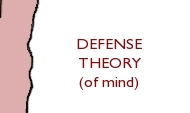|
G. Thomas Couser (2008), in “Signifying Bodies: Life Writing and Disability Studies,” examines the rhetorics that colonize autobiographical, disability narratives: rhetorics of triumph (featuring the hero who overcomes obstacles), rhetorics of nostalgia (remembering the good ol’ days, the days before disability, before discrimination), rhetorics of spiritual compensation (focusing on God’s will and/or vengeance), and rhetorics of sentimentality (representing disability as “pitiable” or “terrifying”) (110-1). I have an addition to Couser’s not-quite exhaustive list of disability rhetorics**. Especially in reference to “invisible” or transparent disabilities, I have noticed a tendency toward defense narratives—where the author(ed), for many reasons, spends an inordinate amount of her text/life maintaining that, yes, she indeed has Disorder X, and even though her place under the symptomology bell curve stretches like a pregnant woman in spandex, goshdarnit, she’s disabled, and everyone would be wise to believe it, or…she’ll do something disabled-like to prove to you that she is, quite obviously, a beholder of Disorder X. On Wrong Planet, probably the most popular of Asperger’s/ high-functioning web forums, common threads tend to revolve around “is X a symptom of my Asperger’s?” Because our authored A is often a lighter shade of scarlet, because both those we love and those we do not know attempt to explain every iteration of our autism as eccentricity, we are authored into contorting our bodies into a text of defense, one in which we proclaim every personality trait and/or discourse convention** to be autism, to the point where the acts of eating and shitting are markers of a pervasive developmental disorder. Slap in a [literal or metaphorical] forward by Tony Atwood, and one’s embodiment of the defense text is complete. |













